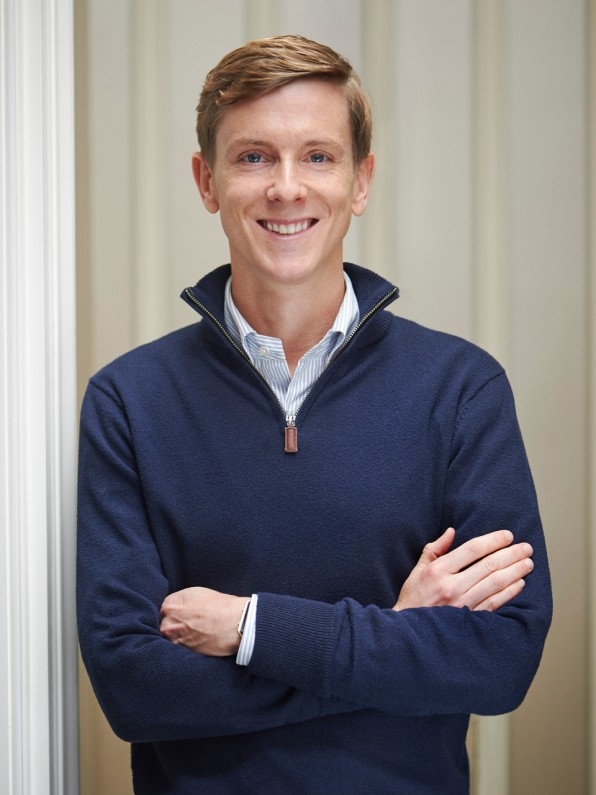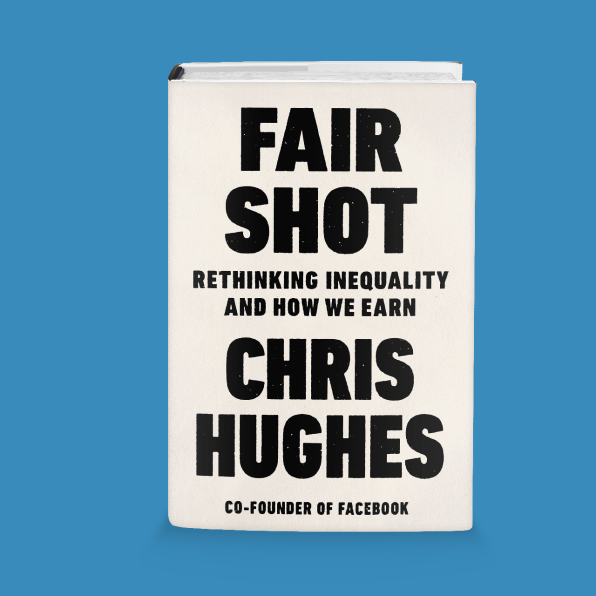When Facebook had its IPO in 2012 and raised $104 billion, Chris Hughes walked away with $500 million. As Mark Zuckerberg’s Harvard roommate, and Facebook’s second ever member, he managed to turn a few years work into a vast fortune. He didn’t even have to code. Hughes’s role in the early years was as Zuck’s “empath”–the one person in the geek team who could communicate and relate to the outside world.

Hughes, who left Facebook in 2007, recounts this in Fair Shot: Rethinking Inequality and How We Earn, his new book arguing for a basic income. His point isn’t to downplay his achievements. He says he worked hard to mold the early brand. He didn’t come from wealth: his beginnings in North Carolina were modest. He got financial aid to go to prep school (Andover) and then Harvard. He earned his opportunities. But Hughes does think $500 million is a ridiculous reward for what he did. When, years later, he was feted at college commencements (and in Fast Company), he didn’t recognize the hero presented. His success wasn’t old-fashioned American Dream-type success–not the hard-won sort of his parents and grandparents.
Winning The Lottery
“I knew what it felt like to achieve great things after working hard for them, and Facebook was indeed an incredible success story. But it was a starkly different kind of success than any of my ancestors had lived. . . . What we’d experienced at Facebook felt more like winning the lottery,” Hughes writes.
Of course, Facebook is an extreme case of extreme wealth. But Hughes links his experience to the modern economy at large. He argues that the same forces that allowed Facebook to control 80% of the world’s social media traffic are not dissimilar with those that allow 160,000 American families to control as much wealth as the bottom 90% of the income scale. Technology, globalization and the pre-eminence of financial capital propelled Facebook to what it became. And they also propelled inequality, instability, and wage stagnation among a large number of people in the lower and middle classes. We’ve created an economy that creates the most winningest of winners–people like Hughes and Zuckerberg—while it does little for millions of others.
“The problem is not that our new economy has fueled the rise of Facebook and mega-winners. It’s that the growth of the ultra-wealthy has come at the expense of everyday Americans,” Hughes writes. “Rapid technological advances, globalization, and financialization are pulling the rug out from under the middle class and lower-income Americans.”

Time For A Basic Income
Basic income is a stipend governments can pay to people to cover their fundamental needs. And it has a lot of fans these days, notably in Silicon Valley. Zuckerberg has said it’s worth studying. Elon Musk, venture capitalist Marc Andreessen, and guru Tim O’Reilly have also spoken favorably of it. Normally, their support is framed as a response to the technology the Valley is itself creating. They argue that we’ll need to find some future way of embellishing people’s incomes if automation makes work either scarce or non-existent.
Hughes isn’t really in that camp. He’s less concerned with 2030 or 2050 and more concerned with now. He says a lot of economists think the “end of work” thesis is ahistorical hokum anyway. And, even if they are wrong this time, he says basic income makes sense in our current circumstances. The working poor are already finding it hard to live on what they earn at Walmart and McDonald’s. And the middle class is doing worse than income levels might suggest (the median income is about $59,000 a year). Though food and many consumer goods (big screen TVs!) are cheaper than ever, the big stuff like college, healthcare and housing, keep costing more. The stuff that families need to be more financially stable and socially mobile are the most out of reach. Between 1995 and 2015, the cost of living, including these key items, rose by 30%, according to an analysis by NPR Marketplace.
Hughes proposes giving everyone earning less than $50,000 a year an extra $500 a month, provided they are working in some way. That includes not only people with jobs in the classic sense, but also freelancers and contractors on less stable incomes. It also includes people bringing up kids or looking after “dependents,” who are often excluded from poverty-reduction discussions, but who arguably do as much work as anyone. A family of four on $38,000 a year would, therefore, see their income bumped up to $50,000. About 90 million Americans in total would benefit.
“The guaranteed income would create a floor below which people could not fall, a reliable foundation for people to build on,” Hughes writes. “It wouldn’t be enough money on its own for anyone to live on. It would be supplement income from other sources like formal labor, a job in the gig economy, informal work, or other government benefits.”
Hughes’s version of guaranteed income (his preferred phrase) isn’t as ambitious as some other proposals. Some purists would like a benefit paid to everyone, even the rich, as this might be an easier sell politically (nobody can complain about preferential treatment) and easier to administer (no need to check out what people are earning). Hughes prefers to set the threshold at $50,000 because, well, poorer people need it more. The money would come from an additional tax on people earning more than $250,000 a year. He’s not in favor of collapsing other social assistance programs to pay for a unified basic income scheme, as some advocates, particularly on the right, have suggested.
We already have a workable way of paying for a basic income, Hughes says: the Earned Income Tax Credit (EITC). The program, which sends $70 billion in tax refund checks to 26 million families and individuals a year, is a proven success story. It lifts more people out of poverty than food stamps, unemployment insurance, and housing vouchers combined and it helps people into employment. It also has supporters on the left and the right. Hughes suggests simply expanding the EITC to include more people and making the program more visible and dependable. Currently, EITC amounts depend on earnings and annual checks arrive unpredictably. Hughes would make the EITC payments monthly, by direct deposits, for the guaranteed amount.
Hughes says there needs to be more “movement building” before basic income becomes a reality. He’s trying to achieve that through his Economic Security Project nonprofit, which brings together academics, activists and technologists, and funds research, including a basic income trial in Stockton, California. Democrats may get behind basic income in the 2020 election cycle if they’re looking for bold, non-traditional economic ideas, he says.
Hughes is certain, though, that we can’t wait too long. Maybe there will be plenty of jobs in the future, maybe there won’t be any jobs. But, in a sense, the future is already here: the jobs that are available tend to be less secure, pay less well, and come with fewer benefits, than in the past. We already need new ways of supporting people other than simply saying “get a job.”
“People find it hard to find financial stability even in the jobs they already have,” Hughes tells Fast Company. “We have near-record unemployment and record high stock prices, and yet median wages have barely budged [in recent years] and jobs are unreliable. We keep talking about 2050 and self-driving cars. But if we’re talking about starting today, we need something that’s affordable and doable and that has a real power to help people who need it the most.”
Fast Company , Read Full Story
(59)